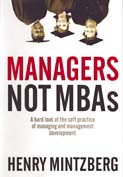Fall from Grace

Some high-flying CEOs have crashed and burned in recent years, taking company profits and public confidence down with them. What's happening to corporate leadership? McGill Management professor Henry Mintzberg says part of the problem lies in the way universities are training managers.
Henry Mintzberg is, quite probably, Canada's most famous business professor.
"If there is a superstar management academic in the largely anonymous ranks of Canada's business schools," mused the Toronto Star recently, "then he is a 65-year-old Montrealer who teaches management studies at McGill University."

Management professor Henry Mintzberg.
Jean-François Bérubé
Mintzberg, BEng'61, was the first business professor in the country whose work was deemed impressive enough to earn entry into the prestigious and choosy Royal Society of Canada - an academic all-star collection of sorts, featuring many of Canada's most accomplished scholars and scientists.
Many of his books, including The Nature of Managerial Work and The Rise and Fall of Strategic Planning, are considered classics in his field. He has earned one of the Quebec government's highest honours, the Prix du Québec, as well as the Harvard Business Review's coveted McKinsey Award for excellence in management thinking.
And yet, when it comes to a certain kind of meeting, despite all the fame and the accolades, Mintzberg is remarkably unpersuasive in his efforts to get others to see things his way.
It happens regularly. A friend or acquaintance or relative will send a son or a niece or their neighbour's kid to visit with Mintzberg.
"Henry is a world-famous business professor," they'll counsel their son/niece/neighbour's kid. "If you want to know all about MBA programs and which ones are the best, he's the guy to go to."
But once the young executive wannabes pop into Mintzberg's office ready to receive an insider's perspective on MBAs, Mintzberg swiftly punctures their expectations.
"Here are all the reasons why you shouldn't enrol in an MBA program," Mintzberg will say. And he will have a lot of reasons. Enough to fill up six chapters of a book he published last year called Managers Not MBAs. And once Mintzberg has had his say, the slightly dazed management aspirant will get up, shake Mintzberg's hand and, almost always, ignore the advice and enrol in an MBA program anyway.

Mintzberg readily understands why. As he writes in Managers Not MBAs, a book that has caused business schools considerable duress since its arrival in bookstores, the arguments put forward by the aspiring managers in favour of getting an MBA are potent. "A big salary, an important job, recruiters falling all over me, maybe even a signing bonus like a football star - the fast track, the good life."
Problem is, argues Mintzberg, MBAs "train the wrong people in the wrong way for the wrong reasons." Young people with little managerial experience shouldn't be wielding such clout in the corporate world, just because they nailed a case study or two in a setting far removed from real life.
"Trying to teach management to someone who has never managed is like trying to teach psychology to someone who has never met another human being," Mintzberg insists.
According to Mintzberg, MBA programs tend to attract people whose self-esteem often outstrips their competence, and then dangerously bolster their confidence so that they believe they are capable of managing and making executive decisions even though they haven't done it before.
What they've been doing instead during their MBA studies is often the academic equivalent of playing dress-up - working on case studies. This isn't necessarily bad, unless you pretend - as too many MBA programs do - that such exercises equal the hard-won experience practising managers earn by making dozens of real-life decisions each day.
Mintzberg heaps scorn on those who think they've earned their managerial stripes by excelling in "a situation that everyone in the room has read, but no one has experienced, for decisions that can be made, but never implemented. Some decision making! Some managing!"
Listen to Mintzberg expound on his views for a while and he comes across more like an NDP candidate than a guy who fields daily requests to share his expertise with executives at business gatherings.
In Mintzberg's view, CEOs (especially in the U.S.) tend to be overpaid and overrated. Corporations have real social obligations towards the communities in which they are rooted. Handing out pink slips in order to temporarily boost stock prices is nothing to be proud of, especially if you're recklessly disregarding your company's long-term needs. Mindlessly following the latest management trend is just foolish. Nothing trumps the knowledge acquired from years of thoughtfully doing your job.
Such views have earned him a repu-tation as an iconoclast in management circles.
"When I notice that the emperor has no clothes on, I just point it out," says Mintzberg.
"He has always seen the world his own way, and he is very dogged and determined - especially to describe what he sees, rather than what the theorists might say he should see," notes Jonathan Gosling, director of Exeter University's Centre for Leadership Studies.
"A lot of what I do is easy. I see the things that people do and I write about it," adds Mintzberg. "It's so patently obvious to me, I'm surprised when no one else has said it."
Some of Mintzberg's critics (and there are not as many as one might think) say he exaggerates the ill influence of the MBA. They would argue that greed, both individual and corporate, existed long before anyone had heard of MBA programs, as did inflated egos and managerial incompetence.
But Mintzberg's insights into managing still seem too valuable to ignore for business leaders. When the Accenture Institute for Strategic Change compiled a ranking of the world's 50 most important "business gurus" in 2002, no one was surprised to see Mintzberg make the list alongside such famous figures as Michael Porter, Robert Reich, Peter Drucker and Stephen Covey.
Tom Peters, one of the few business thinkers whose fame eclipses Mintzberg's, calls The Rise and Fall of Strategic Planning "the best manager book of the last 25 years."


